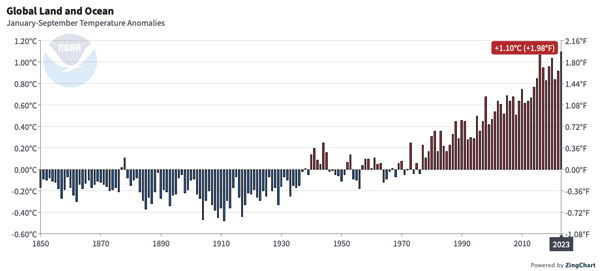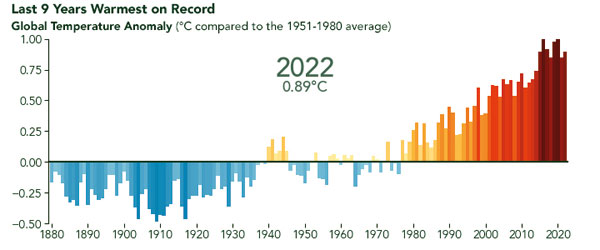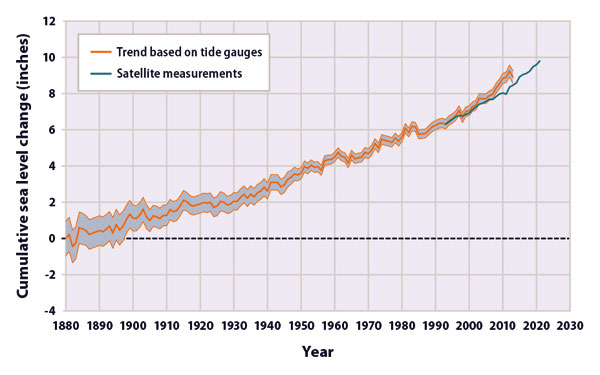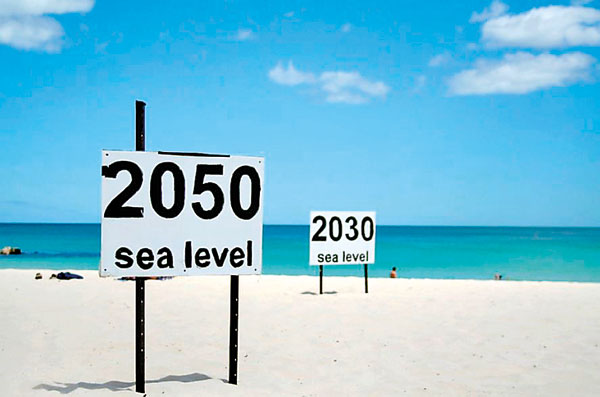The need for ESG instead of CSR
View(s):- Having the presence of CSR has only increased the temperature of the world over the last 50 years
The previous essay emphasised the significance of ESG in contrast to CSR practises alone. The purpose of this week’s article is to alert you to something quite concerning. The anomalies in the worldwide temperature from 1850 and 2023 are shown in the following graphic. It is clear that from 1850 to the 1930s, there were temperature anomalies of minus (-). What took place next?
Factory construction started in 1918 and continued throughout the industrial revolution. Aside from the COVID pandemic, there was never a year in which there wasn’t a new factory established globally. This cleared the path for a sharp rise in global warming, as seen by the indicators, which during the past 50 years have only turned red. What effects does the planet Earth’s rising temperature have?
Extreme rains, wildfires, and droughts are examples of changes that are occurring more quickly than previously thought by scientists. In fact, modern humans have never before witnessed the observed changes in our global climate, and some of these changes are irreversible over the next hundreds to thousands of years, according to the Intergovernmental Panel on Climate Change (IPCC), a United Nations body established to assess the science related to climate change.
What are the other effects
of climate change?
1. Flash floods: I’m sure that even in Sri Lanka, these are happening more frequently than not these days.
2. Biodiversity - Many plant and animal species are finding it difficult to adapt to the rapid changes in climate. Biodiversity is responding to climate change and will continue to do so, according to abundant data. Changes in phenology—the behaviour and life cycles of plant and animal species—as well as species abundance and distribution, community composition, habitat structure, and ecological processes are examples of direct consequences.
3. Rising sea levels in coastal locations – Throughout the 20th century, there was an increase in sea level, and this tendency has intensified recently. The primary reason of the rise is the seas’ thermal expansion brought on by global warming. However, the Antarctic ice sheet and glacier ice loss are also factors. By the end of the century, sea levels are expected to rise by an average of 60 to 80 cm in Europe, primarily due to the rate of melting of the Antarctic ice sheet. The majority of our cities and towns would disappear off the Sri Lankan map if the same thing happened to us in Sri Lanka.




Within 50 km of the shore, about one-third of all EU residents reside, and their GDP accounts for more than 30% of the Union’s overall GDP. The assets located 500 metres or less from Europe’s coastlines are worth an estimated 500 billion to 1,000 billion euros.
4. Freshwater availability – As the climate warms, precipitation patterns shift, evaporation rises, glaciers melt, and sea levels rise. The availability of fresh water is impacted by each of these factors.
Water quality is predicted to decline as a result of more frequent and severe droughts as well as rising water temperatures. The problem of water shortage, which has been primarily created by human activities, will deteriorate as a result of these conditions encouraging the growth of poisonous algae and bacteria.
5. Droughts and wildfires: It goes without saying that droughts frequently have repercussions on a variety of areas, including water, biodiversity, agriculture, forestry, and transportation infrastructure. They raise pest attacks, stunt crop and tree growth, lower river and groundwater levels, and feed wildfires.
6. Fresh/inland water - Since aquatic species can only withstand a certain range of temperatures, water temperature is one of the key factors determining the general health of aquatic ecosystems. Climate change has raised river and lake water temperatures and reduced ice cover, which has an impact on freshwater ecosystems and water quality.
7. Marine environment – The physical and biological composition of the seas will be drastically altered by the effects of climate change, which include rising sea surface temperatures, ocean acidification, and changes in wind and current patterns. Geographical fish distribution may shift in response to changes in ocean circulation and temperature.
Apart from the aforementioned environmental hazards, there will also be an abundance of social and commercial risks to contend with. It follows that merely voicing concern about global warming will no longer be sufficient. The majority of people on the planet today rely on air conditioning, which uses the most energy. It goes without saying that this includes both vehicle and building air conditioning. The more often it occurs, the more energy it demands. It follows that this will undoubtedly become a vicious cycle. For all the reasons listed above, brands must consider ESG factors in addition to CSR. ESG is not something that is added to the brand like CSR; rather, it is an integral part of the business itself.
How does ESG help in handling climate change?
Investments that will lessen a company’s greenhouse gas (GHG) emissions—one of the primary causes of climate change—are included in the category of ESG investing, which is defined as investments that seek to promote social responsibility, a healthy environment, and good governance.
ESG criteria are a collection of requirements that a business, corporation, or organisation must meet in order to be considered for investment by socially conscious investors. They follow two decades of work laying the foundation for corporate social responsibility and the formulation of the Sustainable Development Goals (SDGs) of the UN. ESG is a potent weapon for encouraging the public and private sectors worldwide to change course and safeguard our interests both now and in the future. ESG encourages businesses, governments, and communities to make resolute executive pledges to integrating ESG principles across all business lines.
Environmental criteria take into account an organization’s stewardship of the environment. Social criteria look at how the business maintains fair interactions with its employees, suppliers, clients, and customers in the local areas where it conducts business. Proactive leadership, salary equity, internal controls, and shareholder rights are all aspects of corporate governance. In its current and developing form, ESG will support initiatives and programmes that shift attitudes and allocate the funds required to shield people from the direct effects of climate change.
HitAd.lk is the best and biggest mobile phone market in Sri Lanka, and we guarantee you will find what you need here from our extensive listing of mobile phones for sale in Sri Lanka. Whether it’s a budget-priced smartphone for communication, or higher end features with advanced connectivity, there are many different options from which to choose from on our site!


